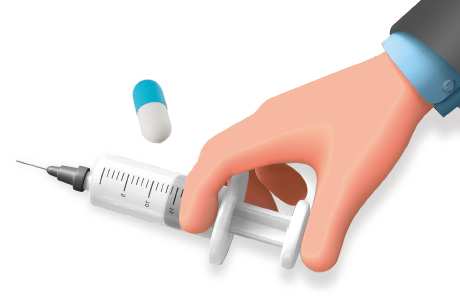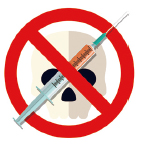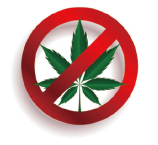
On February 13th, 2023, a man in his 50s broke into several houses in two neighborhoods in Busan and stole six pieces of women’s underwear. He did this under the influence of methamphetamine, so-called crystal meth, wandering around the residential area for about seven hours. Regarding his previous criminal record, the police are investigating thoroughly for any unrevealed drug use.
Moreover, there is an ongoing investigation into narcotic crime allegedly committed by a famous Korean actor. On February 27th, 2023, the Drug Investigation Unit of Seoul Metropolitan Police Agency announced that actor Yoo Ah-in was found to have been prescribed with propofol 73 times in 2021 alone and more than 100 times in 2022. In addition, other than propofol, more drugs, including cannabis, cocaine, and ketamine, were found during hair tests.
Initially, the Ministry of Food and Drug Safety (MFDS) revealed this violation, finding propofol misuse cases, not by a drug target investigation. The MFDS have already stated that the desirable frequency of taking propofol is once a month, for the purpose of simple medical procedures. According to MBC’s News Desk, the police confirmed that a director of a hospital in Seoul even advised Yoo Ah-in not to use too much too often and not to move around hospitals to obtain medications. Police suspect that he was prescribed propofol by demanding anesthesia in a way that exaggerates the pain during medical procedures. As a result, Yoo Ah-in will soon be investigated as a suspect in violation of the Narcotics Control Act.
There are more cases of drug use. A woman named Han Seo-hee is now in prison for drug use. In 2016, she was sentenced to three years in prison, suspended for four years, 120 hours of probation, and a fine of 870,000 Korean won for the use of marijuana and LSD. However, as a result of committing a second offense during the suspended sentence, on July 28th, 2022, the Supreme Court upheld the initial one-and-a-half-year prison sentence. On September 26th, 2022, singer-songwriter Don Spike was arrested for possessing and taking methamphetamine at a hotel in Seoul. A 30 gram bag of the drug, was found on site and seized. In the first trial, he was sentenced to 120 hours of probation and community service, 80 hours of drug treatment, and a fine of 39,857,500 won. However, the sentence of three years in prison was suspended for five years. The appeal by prosecutors is still ongoing.
What Happened to the Drug-Free Country?

South Korea is known for its strict regulations regarding drugs. Irrespective of nationality, people in Korea are prohibited from using any kind of drugs for recreational purposes. Moreover, Koreans are prohibited from taking drugs abroad, including in countries where marijuana or other drug use is legalized. Korean criminal law is based on both the nationality and territorial principles, meaning that anybody who lives in Korea and Koreans living abroad can be punished under Korean law.
Korea has quite a history with recreational drugs. In 1976, President Park Chung-hee introduced the Cannabis Control Act to criminalize the use of drugs. This law was created to combat the increase of recreational marijuana use, which was highly influenced by the presence of the U.S. army. The Cannabis Control Act was later changed to the Narcotics Control Act in 2000.

Within the Narcotics Control Act, “narcotics” are defined into three categories: narcotic drugs, psychotropic substances, and marijuana. All recreational drugs are illegal, but psychotropic substances such as zolpidem and propofol are available under doctor’s prescription. The level of punishment for violating the Narcotics Control Act depends on the type of drugs. For example, smoking marijuana is subject to up to five years in prison or a fine of up to 50 million won.
To determine opinions on Korean drug laws and cases of violation, The UOS Times conducted interviews with two students at the University of Seoul (UOS) (Student A and B), and two foreigners living in Korea, one from England (Interviewee E), and the other from the U.S. (Interviewee U).
Q1. What do you think about drug use in Korea?
Student A I agree that we have relatively strict regulation on drugs. However, I do not think it is rational to prohibit Koreans from taking recreational drugs in countries where it is legal. There are places where such drugs are part of the culture. Nevertheless, as a citizen in Korea, I am obliged to obey Korean law.
Student B I do not think there are many cases of drug use in Korea. Koreans consider recreational drugs as deviance and think of those who use drugs as mentally ill. As a result, I think Koreans in general do not use drugs voluntarily for recreational purposes.
Interviewee E Besides the law, I think Koreans just do not take drugs. Drugs are illegal in England, but people who use them can be easily found on streets, in bars, or in other places. I think the rate of drug use mostly depends on the social atmosphere.
Interviewee U Since I am from California, it was a bit shocking to me that almost no one enjoys the occasional recreational drug in Korea. At first, it was weird that everyone enjoys partying without taking any drugs. Although there are people who violate their laws, I think Korea is quite a drug-free country.
Q2. Despite the strict regulation, there have been cases of violation of the Narcotics Control Act. What is your opinion on the violation cases mentioned above?
Student A Like I said, we should abide by the law. There should be no excuse to use drugs. In the case of the actor Yoo Ah-in, he made an illicit use of law. He deliberately demanded propofol and looked for doctors who could prescribe the drugs. He should be severely punished for his violation.
Student B I think that those who “can” afford drugs violate the law. For the general public in Korea, they don’t think about drugs. However, I think those who know how to get drugs find ways to use them. I think this can provoke distrust of the legal system and make people who obey the law disappointed. I hope whoever violates the law gets what they deserve.
Q3. What is your opinion on the Narcotics Control Act? Do you think it needs to be changed on some level?
Student A I think legitimization of drugs will never happen in Korea, so strengthening the punishment is needed. There are already people who abuse drugs, and more and more people would attempt to if the trend continues. I do not want my country to become drug-friendly.
Student B I think investigation of drug users should be done more frequently. Specifying drug supply routes would be the first step. Moreover, in the case of prescribed drugs such as propofol, people who take those substances should be monitored rigorously. If increasing numbers of people start to take drugs, Korea would no longer be a safe place from possible crimes that drug users might commit.
Interviewee E I heard that Korea is one of the safest countries in the world, and strict regulation on drugs is one of the reasons for this. I like Korea as it is now, so I hope nothing changes.
Interviewee U As a foreigner, I do not think I have much to say in this matter, but this law could use some modifications. I do not understand why Korean people abroad cannot take recreational drugs where they are allowed to do so. When Korean people are traveling where recreational drugs are legal, they cannot have some because they are Korean? I cannot see the point of this part of the law.
With the growing number of violations of the Narcotic Control Act, there are voices that recreational drugs should be legalized in Korea. For example, a Korean rapper, Bill Stax, who was accused of taking ecstasy and smoking marijuana for recreational purposes in 2006 and 2015, is actively arguing in favor of legalization through social media. Moreover, in March 2020, approximately 13,000 people signed his petition for expanding the use of medical marijuana and decriminalizing marijuana for recreational purposes.
He argues that marijuana should not be classified as narcotics since addiction to it is similar to caffeine, it has no hallucinatory effects, and no one has died of it. In addition, he highlights that the use of medical marijuana, legal since 2018, has no practical effect partly because it takes months to purchase it for such use. Those who advocate drug use for recreational purposes continue to argue that they should be free to make choices that could harm them.
Nevertheless, it is still illegal to take prescribed drugs excessively and to use drugs for recreational purposes. Using drugs in Korean society for non-medical purposes only serves to make society chaotic. There are people who try to make society safer and healthier through thorough investigation on the use of drugs. The Korean Association Against Drug Abuse (KAADA) offers rehabilitation and counseling for those who are addicted to drugs and provides information about side effects of drug use. KAADA is present on various social media platforms, such as YouTube, Instagram, Facebook, and Twitter. For Koreans it is their duty to obey the law and comply with rules as citizens, and foreigners who live in Korea should respect their law and regulations as members of the society.
Kim Da-eun
daeunkim749@uos.ac.kr

